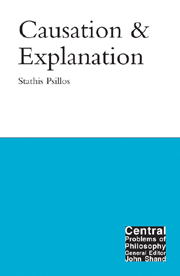7 - Alternative approaches to laws
from II - Laws of nature
Summary
In recent years, there have been a number of alternative approaches to the characterization of laws of nature. They are quite different from each other, but they all unite in claiming that we are not forced to choose between the Humean RVL and the ADT view that laws are necessitating relations among universals. In this chapter, we shall examine the most prominent of them.
Methods and inference-tickets
After reviewing some standard Humean attempts to distinguish between laws and accidents, L. J. Cohen (1980) suggests that they wrongly pay too much attention to the ill-motivated task of defining the conditions under which a statement expresses a law, while they disregard the wider epistemological context in which law statements occur. They look to semantics for an elucidation of the distinction between laws and accidents, but, Cohen argues, the real elucidation comes from looking at the role that laws and accidents play within “cognitive inquiry” (1980: 222). His basic thought is that what distinguishes between laws and accidents has nothing to do with the content of the statements that express them, but, instead, with the methods by which certain statements are arrived at and are justified. Cohen contends that statements that are rightly deemed to express laws of nature are the products of the method of eliminative induction, whereas accidentally true generalizations are the products of implementing enumerative induction.
- Type
- Chapter
- Information
- Causation and Explanation , pp. 179 - 212Publisher: Acumen PublishingPrint publication year: 2002



